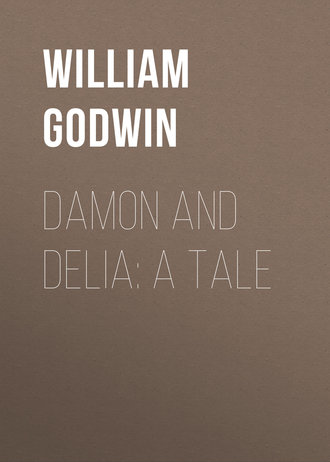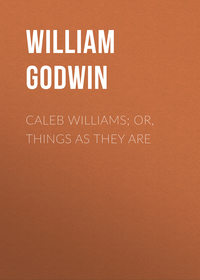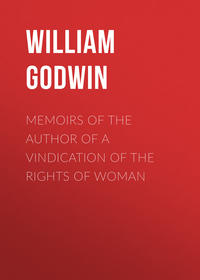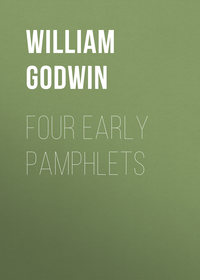 полная версия
полная версияDamon and Delia: A Tale
Or,
I am thy father's spirit."
CHAPTER IV.
A Love Scene
In such conversation the moments passed till they reached the habitation of Mr. Hartley. Miss Fletcher now took her leave. And after a supper as dull, and much more tedious to Delia, than the dinner, she retired to her chamber.
She retired indeed, but not to rest. Her brain was filled with a croud of uneasy thoughts. "Alas," said she, "how short has been the illusion!–But yesterday, I was flushed with all the pride of conquest, and busily framed a thousand schemes of ideal happiness–Where are they now?–The lovely youth, the only man I ever saw in whose favour my heart was prepossessed, and with whom I should have felt no repugnance to have engaged in the tenderest ties, is nothing to me–He loves another. He too complains of slighted passion, and ill-fated love. Ah, had he made his happiness depend on me, what would not I have done to reward him! Carefully I would have soothed every anguish, and taught his heart to bound with joy. But what am I saying?–Where am I going?–Am I that Delia that bad defiance to the art of men,–that saw with indifference the havock that my charms had made! With every opening morn I smiled. Each hour was sped with joy, and my heart was light and frolic. And shall I dwindle into a pensive, melancholy maid, the sacrifice of one that heeds me not, whose sighs no answering sighs encounter!–let it not be said. I have hitherto asserted the independence of my sex, I will continue to do so. Too amiable unknown, I give thee to the winds! Propitious fate, I thank thee that thou hast so soon discovered how much my partiality was misplaced. I will abjure it before it be too late. I will tear the little intruder from my heart before the mischief is become irretrievable."
The following evening Delia repaired again by a kind of irresistible impulse to the grove. She asked not the company of her friend. She dared alone hazard the encounter of that object, at which she had trembled so much the preceding day. Unknown to herself she still imaged a kind of uncertainty in her fate which would not permit her to lay aside all thought of Damon. She determined at all events, to have her doubts resolved. "When there is no longer," said she to herself, "any room for mistake, I shall then know what to do."
As she drew near the alcove, she perceived the same figure stretched along the bank, and with his eyes immoveably fixed upon a little fountain that rose in a corner of the scene. He seemed lost in thought. Delia approached doubtfully, but he heard her not. Advanced near to her object, she reclined forward in a posture of wonder and attention. At this moment a sigh burst from the heart of Damon, and he raised himself upon the seat.
His eyes caught the figure of Delia.–"Ah," said he, starting from his trance, "what do I see? Art thou, lovely intruder, a mere vision, an aerial being that shuns the touch?" "I beg ten thousand pardons. I meaned not, sir, to interrupt you. I will be gone." "No, go not." Answered he. "Thou art welcome to my troubled thoughts. I could gaze for ever."
Saying this he rose and advancing towards her, seized her hand. "Be not afraid," said he, "gentle fair one, my breast is a stranger to violence and rudeness. I have felt the dart of love. Unhappy myself, I learn to feel for others. But you are happy." As he said this, a tear unbidden stole into the eye of Delia, and she wiped it away with the hand which was disengaged from his. "And dost thou pity me," said he. "And does such softness dwell within thy breast? If you knew the story of my woes, you would have reason to pity me. I am in love to destraction, but I dare not disclose my passion. I am banished from the presence of her I love. Ah, cruel fate, I am entangled, inextricably entangled." "And how, sir," said Delia, "can I serve you?" "Alas," said he, in no way. My case is hopeless and irretrievable. And what am I doing? Why do I talk, when the season calls for action? Oh, I am lost."
"Dear Sir," answered Delia, "you terrify me to death." "Oh, no. I would not for the world give you an uneasy moment. Let me be unhappy–but may misfortune never disturb your tranquility. I return to seek her whose fate is surely destined to mix with mine. Pardon, loveliest of thy sex, the distraction in which I have appeared. I would ask you to forget me–I would ask you to remember me–I know not what I am, or what to think."
With these words he took the hand which he still held in one of his, and raising it to his lips, kissed it with the utmost fervour. Immediately he caught up his hat, which lay beside him on the ground, and began to advance along the path that led out of the grove on the side furthest from the town. But his eyes were still fixed upon Delia. He heeded not the path by which he went; and scarcely had he gone twenty paces, ere he changed his mind and returned. Delia was seated on the bank and seemed lost in reverie. Damon threw himself upon his knees before her.
"Ah, why," said he, "am I constrained to depart!–Why must I talk in riddles! Perhaps we may never see each other more. Perhaps the time will come when I shall be able to clear up the obscurity that at present I am obliged to preserve. But no, it cannot be. I never was happy but for two poor hours that I enjoyed your smiles, and, drinking in the poison of your charms, I forgot myself. The time too soon arrived for bitter recollection. My mistress calls, the mistress of my fate. I must be gone–Farewel–for ever."
Saying this, he heaved a sigh that seemed almost to tear his breast asunder, and with the utmost apparent violence he tore himself away, and rushed along the path with incredible velocity.
Delia was now alone. But instead, as she had flattered herself of having her doubts resolved, she was more uncertain, more perplexed than ever. "What" cried she, "can all this mean? How strange, and how inexplicable! Is it a real person that I have seen, or is it a vision that mocks my fancy? Am I loved, or am I hated? Oh, foolish question! Oh, fond illusion! Are we not parted for ever! Is he not gone to seek the mistress of his soul! Alas, he views me not, but with that general complacency, which youth, and the small pretensions I have to beauty are calculated to excite! He had nothing to relate that concerned myself, he merely intended to make me the confidante of his passion for another. Too surely he is unhappy. His heart seemed ready to burst with sorrow. Probably in this situation there is no greater or more immediate relief, than to disclose the subject of our distress, and to receive into our bosom the sympathetic tear of a simple and a generous heart. His behaviour today corresponds but too well with the suspicions that yesterday excited. Oh, Delia! then," added she, "be firm. Thou shalt see the conqueror no more. Think of him no more."
In spite however of all the resolution she could muster, Delia repaired day after day, sometimes alone, and sometimes in company with her friend, to that spot which, by the umbrage of melancholy it wore, was become more interesting than ever. Miss Fletcher, could scarcely at first be persuaded to direct her course that way, lest she should again see the ghost. But she need not have terrified herself. No ghost appeared.
Disappointed and baffled on this side, Delia by the strictest enquiries endeavoured to find out who the unknown person was, in whose fate she had become so greatly interested. The result of these enquiries, however diligent, was not entirely satisfactory. She learned that he had been for a few days upon a visit to a Mr. Moreland, a gentleman who lived about three miles from Southampton.
Mr. Moreland was a person of a very singular character. He had the reputation in the neighbourhood of being a cynic, a misanthrope, and a madman. He kept very little company, and was even seldom seen but by night. He had a garden sufficiently spacious, which was carefully rendered impervious to every human eye. And to this and his house he entirely confined himself in the day-time. The persons he saw were not the gentlemen of the neighbourhood. He had no toleration for characters that did not interest him. When he first came down to his present residence, he was visited by Mr. Hartley, Mr. Prattle, squire Savage, lord Martin, and all the most admired personages in the country. But their visits had never been returned. Mr. Prattle pronounced him a scoundrel; squire Savage said he was a nincompoop; and lord Martin was near sending him a challenge. But the censures of the former, and the threats of the latter, had never reached his ears. His domestics were numerous, but they were hired from a distance, and were permitted as little communication as possible with the powdered lacquies of Southampton. Of consequence, however much the unaccommodating conduct of Mr. Moreland disposed his neighbours to calumniate him, scandal was deprived of that daily food which is requisite for her subsistence, and the name of that gentleman was scarcely ever heard.
CHAPTER V.
A Man of Humour
We will now return to lord Martin. All his messengers, from what cruel fate we cannot exactly ascertain, miscarried; and it was not till Damon had left the country, that he learned that he had been a visitor at the house of Mr. Moreland. Finding that he had missed his expected vengeance, he discharged his anger in unavailing curses, and for three days he breathed nothing but daggers, death, and damnation. Having thus vapoured away the paroxysm of his fury, he became tolerably composed.
But adverse fate had decreed a short duration to the tranquility of his lordship. Scarcely had the field been cleared from the enemy he so greatly dreaded, ere a new rival came upon the stage, to whose arms, though without any great foundation, the whole town of Southampton had consigned the charming Delia.
The name of this gentleman was Prettyman. He was just returned from his travels, and was reckoned perfectly accomplished. He was six foot high, his shoulders were broad, his legs brawny, and his whole person athletic. The habits however he had formed to himself in foreign countries, will not perhaps be allowed exactly to correspond with the figure which nature had bestowed upon him. He generally spent two hours every morning at his toilette. His face was painted and patched, his whole person strongly perfumed, and he had continually in his hand a gold snuff-box set with diamonds. His voice was naturally hoarse and loud, but with infinite industry he had brought himself to a pronunciation shrill, piping, and effeminate. His conversion was larded with foreign phrases and foreign oaths, and every thing he said was accompanied with a significant shrug.
The same period which had introduced this new pretender to the heart of Delia, had been distinguished by the arrival of a Sir William Twyford, who paid his addresses to Miss Fletcher. Sir William was exactly the reverse of Mr. Prettyman. With a genteel person, and an open and agreable phisiognomy, his manners were perfectly careless and unstudied. A predominant feature in his character was good nature. But this was not his ruling passion. He had an infinite fund of wit and humour, and he never was so happy as when he was able to place the foibles of affectation in a whimsical and ridiculous light.
As it was vanity alone, that had induced Mr. Prettyman to pay his addresses to the lady, who was universally allowed to surpass in beauty and every elegant accomplishment in the place in which he was, he would have been less pleased that his amour should have terminated in a marriage, than that by his affectation and coquetry he might break the heart of the simple fair one. Accordingly, it was his business to make the affair as public as possible.
Lord Martin, had been sufficiently irritated by the pretensions of Damon. The new intruder had wrought up his passion to the highest pitch. In the mean time he had renewed an acquaintance which he had formerly made with sir William Twyford. Sir William, upon all occasions, cultivated the intimacy of such, as, by any striking peculiarities, seemed to furnish a proper subject for his humour. He now contributed every thing in his power to inflame his lordship against Mr. Prettyman. He offered to become the bearer of a challenge, and to be his lordship's second in any future combat.
Lord Martin broke off the conversation somewhat abruptly, and began to reflect with himself upon what had passed. He had hitherto contrived, by some means or other, though he dealt very largely in challenges, never to have come to actual battle. But he had too much reason to think, that if he made sir William his messenger, he should not be able with any degree of honour to contrive an evasion. "It is true," said he, "I am in a most confounded passion, but a wise general never proceeds to action without having first deliberated. Zounds, blood and fire! would I could put an end to the existence of so presumptuous a villain! But then it must be considered that Mr. Prettyman is six foot high, and I am not five. He is as athletic as Ajax, but to me nature has been unfavourable. It is true I understand cart and terce, parry and thrust, but I have heard that Prettyman studied under Olivier. Many a man has outlived the passage of a bullet, or the thrust of a sword through him. But my constitution is so delicate! Curse blast it, death and the devil, I do not know what to do."
Sir William, as soon as he had left lord Martin, repaired to the lodgings of Mr. Prettyman. After a short general conversation, he began, "My dear friend, here has happened the unluckiest thing in nature. You have made some advances, you know, to the charming Delia." "True," cried Prettyman, "I have bestowed upon her a few condescending glances. C'est une charmante fille." "Well," added sir William, "and the whole town gives her to you." "Parbleu! the town is very impertinent. There will go two words to that bargain." "My lord Martin, you know, has enlisted himself amongst her admirers." "Pox take the blockhead, I suppose he would marry her. Bien. After I have led her a dance, he shall do what he pleases with her." "But," said sir William, "my lord intends to call you to an account." "Morbleu," cried Prettyman, "I thought I had been in a land of liberty." "But let me tell you, my lord is very absolute. He has fought some half a dozen duels in his time, and every body is afraid of him." "J'en suis excèdè. 'Pon honour, the girl is not worth fighting for." "Oh," said the malicious wit, "but if you give her up for a few threats, your reputation will be ruined for ever." "Mon Dieu! this reputation is a very expensive thing. Je crois that every girl is a Helen, never so happy as when people are murdering one another, and towns are fired for her sake. Is this same milord absolutely inexorable?"
"I cannot tell," said sir William, "what may be done. If you were to fly, he would pursue you to the ends of the earth. But suppose now you were upon your knees, to retract your pretensions to this silly girl." "Pardi" answered Prettyman, "that is damned hard! are you sure his lordship is so compleat a master of the science of defence?" "Nay," replied sir William, "I cannot tell. I believe indeed he never received a wound, but I think I remember to have heard of one duel he fought, in which his antagonist came off with his life." "Ah, diable l'emporte! That will not do neither. These bullets are the aukwardest things in the world. Do you think you could not prevail with his Lordship to use only powder?" "Powder," cried sir William, "that is an excellent jest. My lord always loads with six small slugs." "Six slugs! ah the bloody minded villain! It is confounded hard that a gentleman cannot pass through life, without being degoutè with these unpolished Vandals. Ah, mon cher ami, I will put the affair entirely into your hands: do, pour i'amour de Dieu, bring me out of this scrape as well as you can." "Well my dear Prettyman, I will exert myself on your account; but, upon my soul, I had rather have an affair with half a regiment of commissioned officers fresh imported from America."
Sir William Twyford, having thus brought the affair to some degree of forwardness, now waited on his lordship. "My dear lord Martin," said he, "what have you resolved upon? The affair is briefly thus–you must either give up Delia, or fight Mr. Prettyman." "Give up Delia!" exclaimed the little lord; "by all that is sacred I will sooner spill the last drop of my blood. But," added he, "what necessity is there for the alternative you propose? True, I fear no man. But to be continually engaged in quarrels would acquire me the character of a desperado." "Indeed," said sir William, "you have been somewhat lavish in those sort of affairs, but I do not see how you can be off in the present instance. Prettyman has heard of the bustle you made about the fellow at the ball, that tricked you of your partner; and he will never pardon the affront, if you pay less attention to him." "Pox take the blockhead, he is mighty nice, methinks, in his temper. I have a great mind not to gratify him." "Oh," cried sir William, "you never had such an opportunity to establish your character for ever. And the fellow I believe is no better than a coward at bottom."
It would be endless to relate all the stratagems of sir William to bring the business to the conclusion he wished. How he terrified the brawny petit maítre, and anon he animated the little peer. His lordship felt the force of his friend's eloquence, but even his highest flights of heroism were qualified with temporary misgivings. For poor Mr. Prettyman, he feared to stay, and dared not fly. If he could have forgotten the danger he apprehended, his good natured friend by the studied exaggerations in which he was continually clothing it, would have perfectly succeed in refreshing his memory. But in reality it was never absent from his thoughts. His slumbers were short and disturbed. And he could scarcely close his eyes, ere the enraged lord Martin, with his sword drawn, and his countenance flaming with inexorable fury, presented himself to his affrighted imagination.
At length sir William by his generous interposition affected a compromise. It was agreed that Mr. Prettyman should fall upon his knees before lord Martin in the public room in the presence of Delia, and, asking his pardon, put a small cane into his hand. "My lord," said sir William to the beau, "is as generous as he is brave. He will not make an improper use of the advantage you put into his hands. He will raise you from the humble posture you will have assumed, and, embracing you cordially, all that is past will be forgotten. As his lordship will take you under his protection, not an individual will dare to reflect upon you." "Mr. Prettyman," said sir William to lord Martin, "unites the heart of a chicken to the most absolute skill in the small sword that ever I saw. I have been only capable of restraining him by representing your lordship as the most furious and impracticable of mankind. If he once suspect that I have misrepresented you, a duel, in which I am afraid your lordship would be overmatched, must be the inevitable consequence. Might I therefore presume to advise, your lordship should make use of the advantage I have gained you without mercy."
CHAPTER VI.
Containing some Specimens of Heroism
The evening now approached, in which the scene sir William Twyford had with so much pains prepared, was to be acted. An imperfect rumour had spread that something extraordinary was to pass in the public room. Miss Prim was of opinion that a duel would be fought. "I shall be frightened out of my wits," said she. "But I must go, for one loves any thing new, and I believe there is nothing in it that a modest woman may not see." Miss Gawky thought it would be a boxing match. "Bless us, my dear lord Martin could stand no chance with that great lubberly macaroni." But Miss Griskin, with a look of more than common sagacity, assured the ladies that she had penetrated to the very bottom of the matter. "Mr. Prettyman and lord Martin have ordered two large rounds of beef to be set upon the table at supper, and they mean to lay about them for a wager."
In this manner every one made her own conjecture, which she preferred to that of all the rest. Curiosity was wrought up to the highest pitch, and the uncertainty that prevailed upon the subject, rendered the affair still more interesting. The rooms were early filled with an uncommon number of spectators. About nine o'clock Mr. Prettyman entered, but instead of exerting himself with his usual vivacity, he retired to one corner of the room, and sat in a sheepish and melancholy posture. Not long after, sir William Twyford and lord Martin came in, arm in arm.
The peer strutted immediately to the upper end of the room. Delia stood near him. "My lovely girl," said he, with an air of vulgar familiarity, "I am rejoiced to see you. I hope I shall one day prove myself worthy of your favour."
While this passed Mr. Prettyman was by no means in an enviable condition. From the operation of fear and vexation he perspired very profusely. Vanity, as we have said, might almost be termed his ruling passion, and he would never have sacrificed it so publicly to any consideration less immediate than that of personal safety. Ardently did he long to have the terrible scene concluded. But he had neither strength nor spirits to advance a step, or even to rise from his seat.
Sir William Twyford now came up to him, and took hold of his hand. "My dear friend," said he, "be not dispirited. It is no more than a flea-bite, and it will be over in a moment. You will acquire the friendship of the first personage in the county, and far from losing any thing in the public esteem, you will be more respected than ever." "Morbleu," cried the beau, "my shoulders ake for it already. But, mon très cher & très excellent ami, do not desert me, and remind the peer of the generosity you talked of."
Sir William now raised him from his seat, and led him to the middle of the room. Lord Martin, with a stately air, advanced a few steps. In spite however of all the heroism he could assume, as the important affair drew towards a crisis, he began to tremble. Mr. Prettyman fell upon his knees, and sir William put a cane into his hand. But in this posture the beau remained still somewhat taller than his antagonist. "Most worthy lord," cried he in a tremulous voice, "I am truly sorry for the misunderstanding that has happened, and I am filled with the most ardent"–While he was yet speaking he advanced the cane in the attitude of presenting it. "Villain," said lord Martin, who between fear and rage could no longer contain himself, and snatched it from his hand. But he could scarcely reach beyond the shoulder of his enemy, and blinded with emotion and exertion, instead of directing his blows as he ought to have done, he struck him two or three very severe strokes on the head and face. The beau bore it as long as he could. But at length bellowing out, "Mon Dîeu, je suis meurtriè, I am beaten to a jelly," he rose from his knees. His antagonist being between him and the door, he fairly threw him upon his back, and flying out of the room he stopped not till he arrived at the inn, where, ordering his phaeton and six, he ascended without a moment's pause, and drove off for London.
In the mean time, every thing in the public room was in confusion and disorder. Sir William flew to support the discomfited hero, who had received a grievous contusion in his shoulder. Miss Griskin giggled, the other ladies screamed, and Miss Languish, as usual, fainted away. "Bless me," cried Miss Fletcher, "it is the queerest affair"–"By my troth," said Miss Gawky, "it is vastly fine." "But not half so fine," cried Miss Griskin, "as the buttocks of beef."
By this time lord Martin had raised himself in a sitting posture and uttered a deep groan. "Best of friends," said he, pressing the hand of sir William, "tell me truly, am I victorious, or am I defeated?" "Oh victoria!" cried sir William; "never heed a slight skin wound that you received in the combat." His lordship stood up. "Damnation, pox confound it!" said he, a little recovering himself, "what is become of the rascal? I have not given him half what he deserved. But, ladies," added he flourishing his cane, "it is my maxim, as I am strong to be merciful."









